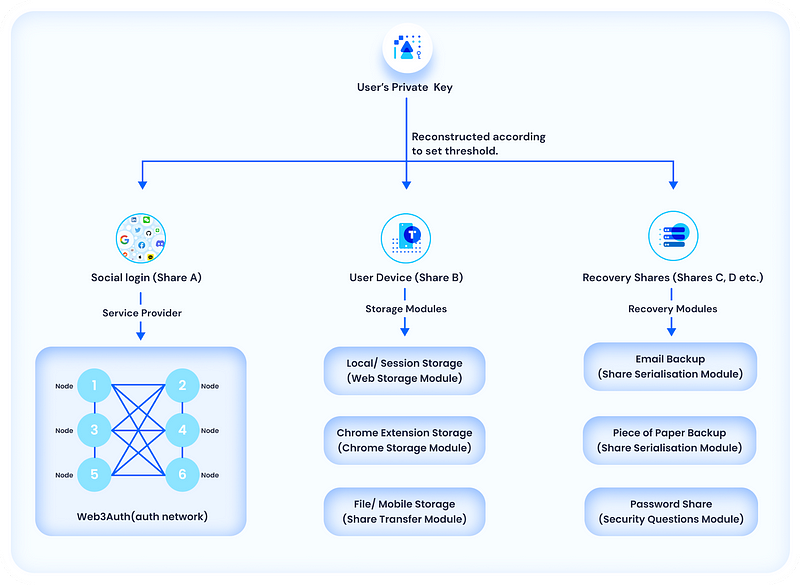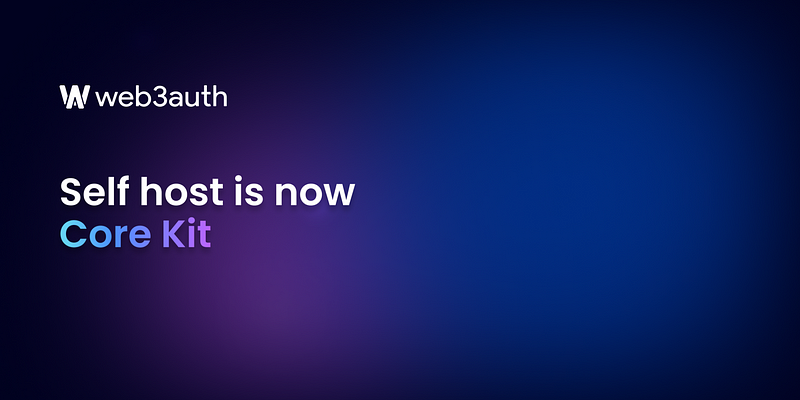Web3Auth Self-host SDK is now Core Kit
Simplification in access — a core principle our entire team at Web3Auth consistently strives for. It has been a significant part of our engineering culture. Today, we move a step closer towards our mission to simplify Web3 wallet infrastructure for everyone.
Our Self-host SDK is now Core Kit
We decided to do a little rebranding to our Self-host SDK, and call it Core Kit. Because it is the core infrastructure that resides underneath all of our products. Simple and easy.
Of course, there are reasons why we chose to change the name.
- The very term self-host could possibly imply that our customers had to do a lot of heavy-lifting.
- It could have been very easily interpreted with our Plug & Play SDK.
Here is a little context pertaining to the underlying technological architecture in our two flagship SDKs — Core Kit (previously Self-host) and Plug & Play.
These SDKs are built on top of an underlying SDK called tKey, which stands for Threshold Key. The tKey SDK manages private keys by generating shares using Shamir Secret Sharing, a threshold cryptographic algorithm technique. The image below shows how the tKey SDK architecture plays out in a virtual environment.

Now when it came to Self-host as a term, ‘hosting by the self’ was a possible misinterpretation we did not want our customers to take away from it.
- Self-host offered a bundled package of core components or UI-less SDKs to help a customer customize their desired user interface (UI) to further generate and manage their shares. This implies only one thing — it empowers you to retain your own brand’s user interface (UI) and user experience (UX) flow.
- On the other hand, the core purpose of our Plug & Play SDK was to offer a standardized and default user interface (UI) and a user experience (UX) flow from Web3Auth — so that our customers could seamlessly generate and manage their desired number of shares.
By definition, this particular SDK is supposed to be a set of tools that would help you build an authentication engine for your platform — essentially, a non-custodial wallet. But the problem is that our Plug & Play SDK also has a similar purpose, but the only differentiation is that — it allows no room to customize any shares.
The change of name to Core Kit also refers to exactly what our SDKs offer — a bundled package of UI-less SDKs (or core components) to help you gain better access and control over the user experience (UX) flows, while retaining your brand.
Here is what the Core Kit entails:
- tKey JS SDK, which works on web and react native.
- A web-based Single Factor Auth SDK.
- A NodeJS Server SDK hosted on the backend nodejs server.
“Owing to this potential misinterpretation, we wanted to take this space and opportunity to explain why we decided to do this rebranding.”
As we move forward, we are soon going to launch the tKey Android iOS SDKs over the coming few months. Besides, we are also going to launch an aggregator SDK for all of the Core Kit in Web, to allow for better ease of integration.
If you are an enterprise looking to add a powerful web3 component to your existing systems, look no further — Core Kit is here!
Furthermore, below is a summary of all the other product updates we have:
A revamped Plug & Play SDK
Our Plug & Play suite now has all UI SDKs, giving you quick and easy access to our platform.
Here is what the suit includes:
- a Web Modal SDK
- a Web No Modal SDK
- an Android SDK, an iOS SDK
- a React Native SDK
- a Flutter SDK
- a Unity SDK
- a Unreal SDK is out, documentation will be launched soon
Updated documentation
All of our documentation has been revamped with a new quick start, and general flows to highlight our products and integration better.
Check them out here.
We’re on Discourse, our newest community portal!
We have now fully migrated from GitHub Discussions to a brand new community forum on Discourse to enable a superior community support experience, better search capabilities, more accurate suggestions, and quicker responses.
Join our community forum here.
Over the last 4 years, our team at Web3Auth has been able to onboard over 500 applications and wallets across Web2 and Web3. Today, we manage more than 12 million user keys a month, a growth that is significant and exponential from that of our previous years.
Traditional wallet authentication methods such as seed-phrases, are difficult to remember and are vulnerable to phishing attacks. We have been working hard the last 4 years on various key management technologies and we believe we have been instrumental in pioneering this paradigm shift in the industry, especially after having launched our Multi-Party Computation (MPC) technology.
But this is only the beginning. As we continue this journey to achieve our audacious mission, which is to make digital ownership human-centric and accessible to everyone, we want to thank you for being a part of our thriving community and for your support in helping us build this wallet infrastructure for all.
We’d love for you to try out Core Kit, the Plug & Play SDKs, and join us in the product conversations on Discourse.





